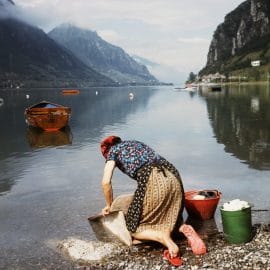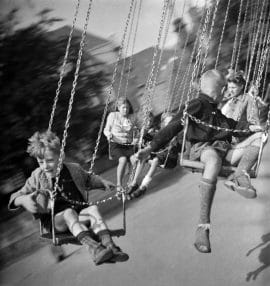Artist: Steef Zoetmulder (1911-2004)
Roses, 1948.
Vintage gelatin silverprint by the photographer, later printed, print size 26x20cm, on paper size 32x25verso, not signed and not stamped.
Provenance: heritage collection of the family Zoetmulder.
Literature: “Steef Zoetmulder, Subjective Photography, 1940/1960”, Uitgeverij Voetnoot Amsterdam, 1992 (pages 66/67).
‘Art is art- and everything else is everything else’, American purist painter Ad Reinhardt once said. You can say the same about the photography by Steef Zoetmulder, though he is in no sense a photographic purist.
We could describe his photographic work as lyrical and symbolic. It is photo art, pre-eminently. The geometrical structure of his images, their constructive character, their directness and their lack of superfluous frills, the contrast of black and white, are all features that we also find in the work of Lászlo Moholy-Nagy, Man Ray and Herbert Bayer, the great pioneers of art photography, and in the work of Otto Steinert.
Subjective photography’s emergence as a typical postwar phenomenon can be put down to the exhibition which Otto Steinert organized in Saarbrücken in 1951 under the title ‘Subjektive Fotografie I’. Thanks to this excellent travelling exhibition the term became common currency both in Germany and elsewhere.
As early as the late thirties, however, Steef Zoetmulder was expressing the opinion that photography stood a chance of becoming ‘art’ only if it gave leeway for subjectivity in its content too. In that period, Zoetmulder’s work was to be seen in all the main group exhibits of European photography; it was thus a matter of course that Steinert asked him to participate in the Saarbrücken exhibition of 1951.
Zoetmulder (born in Schiedam, the Netherlands, 1911) was, and remained, a subjective photographer in his non-commercial work. In the years up to 1960, he cultivated a severity of form and a strength of artictic vision, combined with a classical aesthetics. Looking back over his career, we can see that his modest, reserved character has been the reason that so few people are acquainted with his oeuvre today.
Collections: Nederlands Foto Museum-Rotterdam, Prentenkabinet van de Rijksuniversiteit-Leiden, Van Reekum Museum-Apeldoorn, Stichting Nederlandse fotografie-Amsterdam, Stichting Nederlands Foto & Grafisch Centrum-Haarlem, Stedelijk Museum-Schiedam, Centrum Beeldende Kunst-Rotterdam, Randstad Uitzendbureau-Amsterdam, Museum Voorlinden-Wassenaar, Galerie Baudelaire- Antwerpen, Provinciaal Museum voor fotografie-Antwerpen, LaSalle National Bank-Chicago, Paul M. Hertzman-San Fransisco, National Gallery-Canberra Australië.









There are no reviews yet.